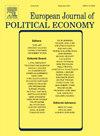主导地位和技术战争
IF 2.3
3区 经济学
Q2 ECONOMICS
引用次数: 0
摘要
本文比较了三种技术领导体制。首先,单极世界中的技术创新,一个占主导地位的国家可以将其技术出售给一组小国。其次,两个大国与独立小国之间的领导权竞争。第三,一个脱钩的世界,所有的小国都与一个或另一个大国结盟。小国在独立时表现最好,而大国在竞争领导地位时表现最好。大国更喜欢单极领导。如果有两个大国,他们更喜欢一个被划分为影响力区域的脱钩世界,而不是相互竞争。本文章由计算机程序翻译,如有差异,请以英文原文为准。
Dominance and technology war
Three regimes of technology leadership are compared. Firstly, technological innovation in a unipolar world with one dominant country that can sell its technology to a set of small countries. Secondly, competition for leadership between two large countries, with small countries that are independent. Thirdly, a decoupled world in which all small countries are allied with one or the other big country. Small nations fare best when they are independent and large nations engage in leadership competition. Great power nations prefer unipolar leadership. If there are two big nations, they prefer a decoupled world that is partitioned into zones of influence, compared to competing with each other.
求助全文
通过发布文献求助,成功后即可免费获取论文全文。
去求助
来源期刊

European Journal of Political Economy
Multiple-
CiteScore
3.40
自引率
10.00%
发文量
106
期刊介绍:
The aim of the European Journal of Political Economy is to disseminate original theoretical and empirical research on economic phenomena within a scope that encompasses collective decision making, political behavior, and the role of institutions. Contributions are invited from the international community of researchers. Manuscripts must be published in English. Starting 2008, the European Journal of Political Economy is indexed in the Social Sciences Citation Index published by Thomson Scientific (formerly ISI).
 求助内容:
求助内容: 应助结果提醒方式:
应助结果提醒方式:


